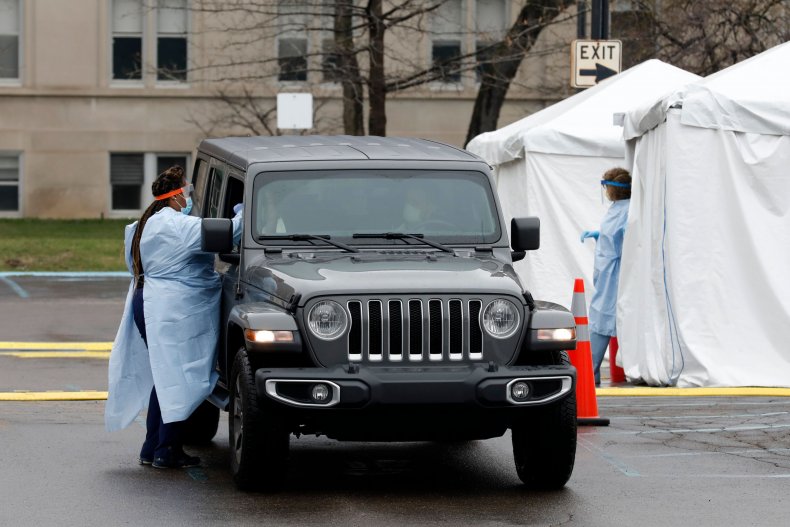A sharp rise in coronavirus cases throughout Michigan could be connected to an increase in variants, including over 1,600 cases of the U.K. variant known as B.1.1.7, public health experts have warned.
Michigan is now leading the nation in terms of COVID-19 cases by population. Roughly 453 people out of 100,000 are infected with the coronavirus throughout the state, and data from the New York Times has shown that the six worst metro areas in the country with new outbreaks are all in Michigan.
Cases and hospitalizations have more than doubled in the past two weeks, as well, and the state has averaged more than 6,700 new cases a day in the last seven days, according to the Times.
Michigan has the second-largest number of variant cases in the U.S., next to Florida, according to data from the Centers for Disease Control and Prevention (CDC). The state has now identified as many as five variants of the coronavirus, with the B.1.1.7 variant as the most widespread.
There have been 1,649 recorded cases of the B.1.1.7 variant in Michigan, the CDC reported.
“The presence of more infectious variants, such as the B 1.1.7 variant, threatens our progress in control of the epidemic and [Michigan Department of Health and Human Services (MDHHS)] will be monitoring data closely,” Lynn Sutfin, an MDHHS spokesperson, told Newsweek on Tuesday.
“The most important thing people can do is to get the safe and effective COVID-19 vaccine to protect themselves and their families, and help us eliminate this virus once and for all,” Sutfin added.
JEFF KOWALSKY/Getty Images
MDHHS Senior Public Health Physician Natasha Bagdasarian said Monday that the current surge is similar to the state’s previous peak last fall.
“Things are not looking good in terms of our current COVID status. It very much is like our peak that we saw in the fall,” Bagdasarian told Fox 2. “What we’re concerned about is, while some variants are already here, we don’t want additional introduction of those variants.”
Speaking with PBS on Monday, Dr. Nicholas Gilpin of Beaumont Health added that the state’s rising cases are likely linked to the B.1.1.7 variant, as well as loosening coronavirus restrictions.
“We’re seeing a lot more of these COVID variants, specifically the B.1.1.7, or the U.K. variant, which is absolutely in our backyard right now in Michigan,” he said.
“I believe we’re the second-highest state in terms of B.1.1.7. And we know that the B.1.1.7 is not only more transmissible but also potentially more deadly, as well. So, you put those two things together, relaxed restrictions, and a B.1.1.7 more transmissible variant, and I think that accounts for why you’re seeing so many more cases.”
B.1.1.7 was first identified in the U.S. in December and has since become the most widespread variant across the country. According to the CDC, there have been more than 15,500 recorded cases in 52 U.S. jurisdictions.
Gilpin said Monday that with Michigan’s higher case counts, younger people are starting to fill up hospitals.
“Instead of seeing predominantly 60-somethings, now we’re seeing 50-somethings and even some 40-somethings. And that’s really what we’re seeing most the most of in our hospitals right now,” he told PBS. However, he added that those patients have not been using ventilators or taken to ICUs as much.
Sutfin told Newsweek on Tuesday that in response to the increase in new cases, the state is ramping up COVID-19 testing for schools, businesses and nursing homes.
“And we have increased our vaccine program over the last couple of weeks, which has helped us reach an historic milestone of four million vaccines in under four months,” Sutfin said.
“Our goal is to re-engage while reducing public health risk, which is why we move slowly to maintain progress and momentum with thoughtful public health measures. We will continue to monitor the data to make decisions, including three key metrics: case rates, percent positivity and hospitalizations.”
In Michigan, more than 2.9 million residents, or roughly 36.5 percent, have received a COVID-19 vaccine, according to the state’s COVID vaccine dashboard, while more than 1.8 million, or about 22.6 percent, are fully vaccinated.
Newsweek, in partnership with NewsGuard, is dedicated to providing accurate and verifiable vaccine and health information. With NewsGuard’s HealthGuard browser extension, users can verify if a website is a trustworthy source of health information. Visit the Newsweek VaxFacts website to learn more and to download the HealthGuard browser extension.



















